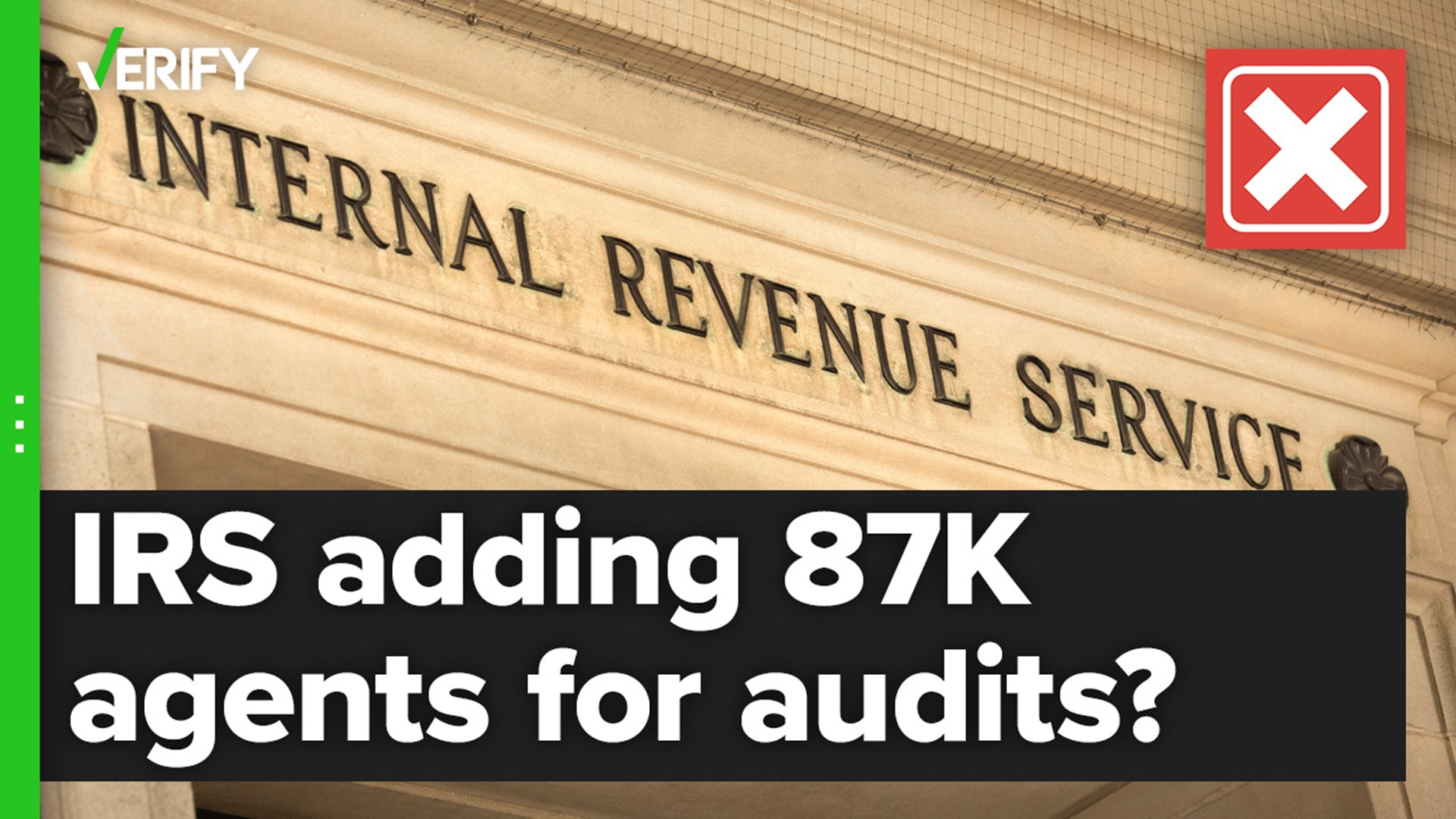The Inflation Reduction Act, passed in August 2022, allocated about $80 billion in funding to the Internal Revenue Service (IRS).
After Congress passed the bill, people on Twitter, including House Speaker Kevin McCarthy (R-Calif.), claimed that the IRS funding would allow the agency to hire 87,000 new agents tasked with auditing middle-class Americans.
Now, those claims are recirculating online after House Republicans passed a bill on Monday, Jan. 9 that would rescind $71 billion of that IRS funding. The Democratic-controlled Senate has vowed to ignore the bill.
THE QUESTION
Is the IRS hiring 87,000 new agents to increase middle-class audits?
THE SOURCES
THE ANSWER
No, the IRS isn’t hiring 87,000 new agents to increase middle-class audits.
WHAT WE FOUND
The Inflation Reduction Act of 2022 includes about $80 billion in funding for the IRS over the next 10 years.
About $45.6 billion of that IRS funding will be put toward expenses for IRS tax enforcement services through September 2031, including hiring more employees.
But the claims that this funding will be used to hire 87,000 new agents specifically tasked with audits are false.
The text of the Inflation Reduction Act doesn’t specify a number of new hires for the IRS. The 87,000 number comes from a May 2021 report from the Treasury Department that estimated more funding allocated by President Joe Biden’s administration would allow the IRS to hire nearly 87,000 full-time employees by 2031.
More from VERIFY: Yes, the Internal Revenue Service did buy nearly $700K in ammunition in early 2022
That report was specific to previous legislation, and it’s not clear yet how many people the IRS will hire with the Inflation Reduction Act funding.
The majority of IRS hires would fill positions of people leaving the agency over the next decade, the Treasury Department said. That includes staff members across departments, not just agents tasked with audits.
An estimated 52,000 IRS employees are expected to leave the agency or retire in the near future.
The IRS will determine the final numbers and breakdown of potential new staff for the next decade in the coming months, but the addition of new employees won’t mean increased audits for middle-class Americans, according to the Treasury and IRS.
“New staff will be hired to improve taxpayer services and experienced auditors who can take on corporate and high-end tax evaders, without increasing audit rates relative to historical norms for people earning under $400,000 each year,” a spokesperson for the Treasury Department said.
In a letter in August 2022, IRS Commissioner Charles Rettig also assured Senate members that the agency would not “increase audit scrutiny on small businesses or middle-income Americans.”
According to the Treasury Department spokesperson, “the resources to modernize the IRS will be used to improve taxpayer services, from answering the phones to improving IT systems,” not just audits.
The IRS announced in late October 2022 that it had hired 4,000 new customer service representatives to help answer phones and provide other services ahead of the 2023 tax filing season. Its goal was to add another 1,000 customer service representatives by the end of 2022, bringing the total number of new hires to 5,000.
Previous analyses of the agency have revealed that the IRS needs more employees. National Taxpayer Advocate Erin M. Collins said in her midyear report to Congress, published in June 2022, that many of the challenges the IRS is facing “stem from inadequate staffing, including limited staffing in Submission Processing and telephone call centers.”
Rettig wrote in his letter that the IRS has “fewer front-line, experienced examiners in the field than at any time since World War II, and fewer employees than at any time since the 1970s.”
“Advances in technology have been helpful but have not kept pace with the ever-increasing responsibilities and challenges facing the IRS,” he said. “As a result, the IRS has for too long been unable to pursue meaningful, impactful examinations of large corporate and high-networth taxpayers to ensure they are paying their fair share.”

